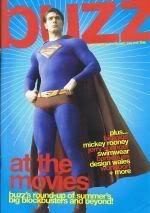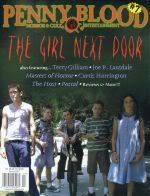Cabin Fever (2002)
Eli Roth's fans famously include Peter Jackson, Quentin Tarantino, and, erm, me. Sadly, most of the rest of the world doesn't seem to share our enthusiasm, so I'm already on the defensive here. Cabin Fever is probably my favourite recent horror movie, and indeed one of my favourite movies ever.
The basic set-up reeks of horror movie cliché. A group of college kids -- themselves walking clichés: the nice girl, the nice guy, the slutty girl, the arrogant guy, the idiot -- head off into the country for a sex and alcohol-fuelled holiday. So far, so Wrong Turn. On the way, they encounter some of the more colourful locals, including Old Man Cadwell (Robert Harris) who's saving his rifle for "niggers", and the awe-inspiring Dennis (Matthew Helms), a little boy with a big mullet and a penchant for biting. See, the thing is, Cabin Fever utilises horror movie clichés by turning them all on their head. The killer lurking into the woods isn't a masked psychopath, but a flesh-eating disease: as each teenager falls victim in their turn, paranoia increases and everything goes completely insane.
Our villain first manifests in the shape of crazy old man Henry (Arie Verveen). Out shooting squirrels -- because "they're gay"; political correctness has no place here -- Bert (James DeBello) accidentally shoots Henry, and when the hermit comes up to the cabin for help, the teens end up setting him on fire. As you do. Unfortunately, this is only the beginning -- Henry falls into the reservoir that supplies the cabin's water, and suddenly an innocuous glass of water takes on sinister undertones. Nice girl Karen (Jordan Ladd) is first to be infected, a fact revealed to the audience in an incident referred to as the "finger-bang misfire" which is destined to haunt their nightmares forever. Roth advocates using sound-effects to increase the effects of gore, and here, it certainly works.
References and homages to earlier horror classics proliferate, the most obvious being the Evil Dead set-up of the cabin. Roth's affinity for the genre is glaringly obvious, but Cabin Fever isn't just derivative. It's a classic in its own right -- or deserves to be. It's the little things that make the difference: Roth's own cameo as stoner Justin introducing the lethal Dr Mumbo outshines any of Shyamalan's contrived director cameos; crazy deputy Winston (Giuseppe Andrews) is wonderfully surreal, as, indeed, is Dennis's return in what must be the most bizarre sequence ever. The expectations and assumptions of a horror-saturated audience are constantly thwarted: the campfire story of the bowling alley massacre sets up a serial killer tale before the virus really comes into play, but ultimately, the virus kills none of the main characters, whose panic is their downfall.
It's almost impossible to talk about Cabin Fever without at least making reference to the infamous leg shaving scene. As Roth is keen to point out in interviews and DVD commentaries, this is based on something that really happened to him -- on a horse farm in Iceland, he contracted a version of the flesh-eating virus and, without really realising what he was doing, shaved part of his face off. It's a story he tells with such glee you get the impression he probably tells it at weddings, funerals, or anywhere else he possibly can. ("No, Eli, it's not the time nor the place, and besides, you've already told everyone...") Though it perhaps stretches the limits of plausibility that, with a flesh-eating virus on the loose, anyone would decide to take a bath and shave their legs, it's a wonderfully powerful scene. Sound effects come into play once again; it's masterfully done, and the third stroke of the razor is enough to make anyone cringe.
It took Eli Roth seven years to convince any studio to make Cabin Fever. Even in production, the movie was plagued by difficulties: filmed soon after the September 11th events, some actors were reluctant to fly; funding was an issue, and the set was completely shut down for a time -- and the killer dog? Yeah, it's worth noticing that the dog is never actually in a scene with an actor. For good reason. The low budget is actually an asset here, as the temptation to resort to cheap, CGI scares or the dreaded MTV edit never arises. Instead, the movie slowly desaturates towards the end; the picture gets granier, subtly decomposing in a way that unsettles without ever being distractingly obvious. Roth's belief in his movie ensured it did finally get made, and I, for one, am grateful. Cabin Fever combines horror and comedy in just the right measures to ensure that the horror never gets too painful nor is ever so undermined by comedy as to render it camp -- I can't praise this movie enough. If there were a Cabin Fever for every White Noise that got released, the horror genre wouldn't be in the trouble it is.
IMDB link










No comments:
Post a Comment